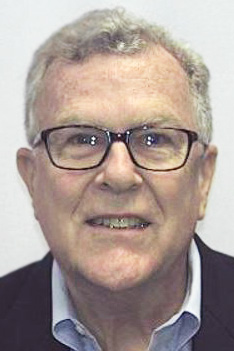
 I recently followed a webinar session organized by the University of Queensland on the factory of the future. Smart or not, the future will still need factories to make the stuff we humans use every day. One of the discussed questions included: "how will existing production models cope with the staggering and ongoing rate of digital disruption and advanced capabilities?" more
I recently followed a webinar session organized by the University of Queensland on the factory of the future. Smart or not, the future will still need factories to make the stuff we humans use every day. One of the discussed questions included: "how will existing production models cope with the staggering and ongoing rate of digital disruption and advanced capabilities?" more
 Teledesic was the first company to plan to offer broadband connectivity using a constellation of low-earth-orbit (LEO) satellites. Craig McCaw, who had sold McCaw Cellular to AT&T, founded Teledesic in 1990 and it got a big visibility and credibility boost when Bill Gates made a small ($5 million) investment in the company. McCaw and Gates were able to attract capital - $200 million from a Saudi Prince, $750 million from Motorola, and $100 million from Boeing, which signed on as the prime contractor. more
Teledesic was the first company to plan to offer broadband connectivity using a constellation of low-earth-orbit (LEO) satellites. Craig McCaw, who had sold McCaw Cellular to AT&T, founded Teledesic in 1990 and it got a big visibility and credibility boost when Bill Gates made a small ($5 million) investment in the company. McCaw and Gates were able to attract capital - $200 million from a Saudi Prince, $750 million from Motorola, and $100 million from Boeing, which signed on as the prime contractor. more
 Data privacy and security experts tell us that applying the "need to know" principle enhances privacy and security, because it reduces the amount of information potentially disclosed to a service provider -- or to other parties -- to the minimum the service provider requires to perform a service. This principle is at the heart of qname minimization, a technique described in RFC 7816 that has now achieved significant adoption in the DNS. more
Data privacy and security experts tell us that applying the "need to know" principle enhances privacy and security, because it reduces the amount of information potentially disclosed to a service provider -- or to other parties -- to the minimum the service provider requires to perform a service. This principle is at the heart of qname minimization, a technique described in RFC 7816 that has now achieved significant adoption in the DNS. more
 The Anticybersquatting Consumer Protection Act (ACPA) creates two distinct avenues by which mark owners may seek a remedy for cybersquatting. A person who is a suitable defendant under 15 U.S.C. §1125(d)(1)(A) is one over whom the court has in personam jurisdiction. However, if the mark owner is "not able to obtain in personam jurisdiction over a person who would have been a defendant" in the ACPA action, then "[t]he owner may file an in rem civil action against a domain name in... more
The Anticybersquatting Consumer Protection Act (ACPA) creates two distinct avenues by which mark owners may seek a remedy for cybersquatting. A person who is a suitable defendant under 15 U.S.C. §1125(d)(1)(A) is one over whom the court has in personam jurisdiction. However, if the mark owner is "not able to obtain in personam jurisdiction over a person who would have been a defendant" in the ACPA action, then "[t]he owner may file an in rem civil action against a domain name in... more
 Researchers at University College London (UCL) have set a new bandwidth record for fiber optic bandwidth transmission. They've been able to communicate through a fiber optic cable at over 178 terabits per second, or 178,000 gigabits per second. The research was done in collaboration with fiber optic firms Xtera and KDDI Research. The press release of the achieved speed claims this is 20% faster than the previously highest achieved speed. more
Researchers at University College London (UCL) have set a new bandwidth record for fiber optic bandwidth transmission. They've been able to communicate through a fiber optic cable at over 178 terabits per second, or 178,000 gigabits per second. The research was done in collaboration with fiber optic firms Xtera and KDDI Research. The press release of the achieved speed claims this is 20% faster than the previously highest achieved speed. more
 As the steward of .ORG, Public Interest Registry is committed to serving as an "exemplary registry" for the DNS. As part of that mission, PIR published our Anti-Abuse Principles last year that serve as our north star to address questions of abuse. As PIR has stated on many occasions, generally speaking, the DNS is not the appropriate place to address questions of website content abuse because of the blunt tool we as a registry have and the collateral damage that can be caused by suspending a domain name for a piece of content. more
As the steward of .ORG, Public Interest Registry is committed to serving as an "exemplary registry" for the DNS. As part of that mission, PIR published our Anti-Abuse Principles last year that serve as our north star to address questions of abuse. As PIR has stated on many occasions, generally speaking, the DNS is not the appropriate place to address questions of website content abuse because of the blunt tool we as a registry have and the collateral damage that can be caused by suspending a domain name for a piece of content. more
 KPIs are industry-specific and should be aligned carefully with your AI strategy. My course at UC Berkeley drills down heavily on how to define success when implementing your AI strategy, and measurement, like anything else, is the top priority. One technique that can potentially be used in your organization as you embark on your AI strategy is to use the SMART method for KPIs. SMART stands for Specific, Measurable, Attainable, Relevant, and Time-Sensitive. more
KPIs are industry-specific and should be aligned carefully with your AI strategy. My course at UC Berkeley drills down heavily on how to define success when implementing your AI strategy, and measurement, like anything else, is the top priority. One technique that can potentially be used in your organization as you embark on your AI strategy is to use the SMART method for KPIs. SMART stands for Specific, Measurable, Attainable, Relevant, and Time-Sensitive. more
 With DNS abuse a topic of increased concern throughout the community, any controversy over adopting the Uniform Rapid Suspension System (URS) for all generic top-level domains (gTLDs) seems misplaced. The URS was designed as a narrow supplement to the Uniform Domain-Name Dispute Resolution Policy (UDRP), applicable only in certain tightly defined circumstances of clear-cut and incontrovertible trademark infringement involving the registration and use of a domain name. more
With DNS abuse a topic of increased concern throughout the community, any controversy over adopting the Uniform Rapid Suspension System (URS) for all generic top-level domains (gTLDs) seems misplaced. The URS was designed as a narrow supplement to the Uniform Domain-Name Dispute Resolution Policy (UDRP), applicable only in certain tightly defined circumstances of clear-cut and incontrovertible trademark infringement involving the registration and use of a domain name. more
 Three years ago, the first Internet-Draft on Registry Maintenance Notifications for the Extensible Provisioning Protocol (EPP) was published, which will become a Request for Comments (RFC). The IETF Registration Protocols Extensions (REGEXT) working group is the home of the coordination effort for standards track EPP extensions. They released eight RFCs over the last couple of years, and they are currently working on more than 15 Internet-Drafts. more
Three years ago, the first Internet-Draft on Registry Maintenance Notifications for the Extensible Provisioning Protocol (EPP) was published, which will become a Request for Comments (RFC). The IETF Registration Protocols Extensions (REGEXT) working group is the home of the coordination effort for standards track EPP extensions. They released eight RFCs over the last couple of years, and they are currently working on more than 15 Internet-Drafts. more
 The .AU Domain Administration (auDA) will soon implement new .AU domain administration licensing rules either late this year or early next year. These rules apply to new registrations and around 3 million existing domain names in the com.au, net.au, org.au, and more .AU namespaces... Previously, an Australian trademark application or registration may constitute the required Australian presence for an .AU domain name, but the domain name need not match the trademark. more
The .AU Domain Administration (auDA) will soon implement new .AU domain administration licensing rules either late this year or early next year. These rules apply to new registrations and around 3 million existing domain names in the com.au, net.au, org.au, and more .AU namespaces... Previously, an Australian trademark application or registration may constitute the required Australian presence for an .AU domain name, but the domain name need not match the trademark. more